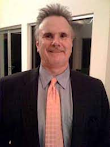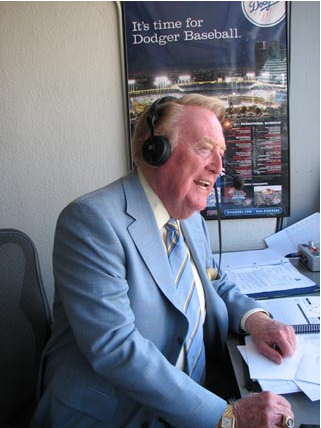Backstory: Meeting Vin Scully
I hesitated writing
this since I didn’t want to take any focus away from those celebrating the life
of the legend, Vin Scully, nor did I
want to be (more) self-indulgent (than usual). I'm aware so much has been published by those far more talented and qualified. However, I think my tale about
meeting and interviewing Mr. Scully (who insisted people call him Vin) allows me to share my insights about the great Dodger broadcaster.
Some background: When I was a contributor to Don Barrett’s LARadio.com, I’d mentioned to him more than once that meeting Vin Scully was on my bucket list. I pitched the idea I could even interview him about his perspective on radio. I’m assuming I became annoying enough because, in August 2011, Don Barrett worked with Bob Moore, Jack Silver, Josh Rawitch, and Eric Braverman to arrange for me to interview Mr. Scully. After I picked myself off the floor, I cleared my calendar to make sure I wasn’t going to miss this opportunity.
The ground rules were made clear to me. I had 30 minutes. I could not ask any questions about the controversies associated with then-owner Frank McCourt. I’d already agreed the questions would focus on radio.
When the day arrived, I realized the microphone I was going to use was busted, I’d have to use a cheap cassette recorder (if you don’t know what’s a cassette recorder, get off my lawn!). L.A. traffic was what it was, so I ran up to the Club Level of Dodger Stadium, hoping I wasn’t embarrass myself by being late.
I was directed to the dining area and there he was. Vin gave me a warm handshake, jokingly said “welcome to my office” and asked if I wanted a cup of coffee. I declined (I actually said “no” to Vin Scully?), then after he finished his brew, we walked to his broadcast booth. There were signs all over stating “no autographs” which made me wonder if I could even take pics for my story.
I wanted to sound like I was prepared. I started the interview recalling a couple of seasons previously, Vin was calling a game on radio only during the playoffs, featuring the animated Jose Lima. I said there seemed a particular joy in his voice being given the rare opportunity to do a non-TV call of the game.
I also was quietly thinking I wish I’d worn something darker than my khakis, as I was afraid in my nervousness before the legend I’d wet my pants.
Vin replied by
saying “I’ve made it a cliché by now,” then proceeded to tell me how radio is
an announcer’s medium providing an opportunity to “paint” an image for the
listener, while TV is more of a director’s medium where words accompany what’s
on the screen. You can read the interview posted earlier for what else I
discussed with him, but please indulge me with a bit more behind-the-scenes memories.
I proceeded with my questions – which I’m sure were hardly original, questions he’d likely answered
numerous times before – yet Vin nonetheless took time to reflectively answer
to each of my inquiries. Within five minutes, I’d not only stopped quivering, I
felt as if I was talking to someone I’d known for years, his friendly and
disarming manner putting me completely at ease. Each response was thoughtful,
not prescribed. Sure, I’d heard Scully tell his story before about how as a
young boy he’d “crawl under a big, four-legged radio that we had in the living
room… the speaker was over my head. And
I was completely captivated by the roar of the crowd.” Yet somehow Vin made the story sound fresh and engrossing.
I realized my 30 minutes was coming to a close, I wanted to respect the time he needed to prepare for that evening’s broadcast. After finishing my last question, I asked if I could take some photos. He offered to turn toward the field and ad lib a call of a game so I could take a photo of him as if he was doing his play-by-play.
Now for those
who know me and have heard the following story (perhaps repeatedly), please skip
the next two paragraphs. Anyway, as I packed up my notes, I commented to Vin
how my parents were impressed with him during the “Nomomania” days. The Dodgers
had brought in a pitching phenom, Hideo Nomo, the first player from Japan to
succeed in the Major Leagues here in the U.S. He was an international sensation.
There was a sportscasting team broadcasting Nomo’s appearances back to Japan
live from L.A. I told Vin how my parents and I heard his on-air cross-talk
segments between himself and the Japanese announcers, with Vin greeting the
announcers with a “konnichiwa” (hello) and asking the team how they were doing,
all in their native language. He explained when the Dodgers traveled to Japan in
1956 for some exhibition games, he’d purchased a Japanese-English dictionary to
learn some phrases which he was still able to recall (that was over 50 years
ago!).
As I departed,
Vin said “make sure you say hi to your parents for me!”
That Sunday I’m
visiting with my parents for our weekly family dinner. I mentioned casually “by
the way, Vin Scully says hello to you.” The response was immediate. “Whaaat?
How you meet Vin Scully?” (Someday my mocking of my parents’ grammar will come
back to haunt me). I showed them the pic of Scully-San and me, they had me
print it on their cheap dot matrix printer. For 15 minutes, I was their
favorite son. It quickly reverted back to my more accomplished younger brother,
but 15 minutes is better than nothing.
Don Barrett published the interview on August 18 & 19, 2011. I received some nice feedback and saw the interview mentioned on a couple of discussion boards. I’d post that photo of Vin and me every November 29 on social media, his birthday.
On the day of Vin’s passing, Rita Wilde posted on Facebook:
There is a sadness over the city.
I was lucky to meet him once.
I knew he was the greatest announcer I
have ever heard but I wasn't expecting to meet one of the kindest humans ever
My reply:
I knew his reputation as being a fine
gentleman, but that hardly described him. Gracious, humble, funny...words fail
me as I remember when I had the privilege of meeting him. There are lots of
arguments about who's the GOAT in football, basketball, etc. But when it comes
to being behind the mic to describe the grass-covered diamond, the case is
closed.
















Comments
Post a Comment